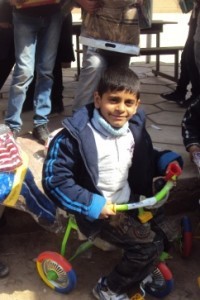
Kindergarteners Omar and Zahra’a remember the day their friend Hassan was killed by a passing car while playing on a neighborhood street. Ask them why Hassan was killed, and they will reply with the innocent candor of children too young to apportion blame: for reasons they cannot comprehend. They and all their friends, much like hundreds of Baghdad children, had played on the street for as long as they can remember, and all simply because they had no other options. With no playgrounds to speak of, and a local kindergarten that their parents described as a “ghost town”, Omar and Zahra’a know all too well the restrictions placed upon them by circumstances in this hardscrabble Baghdad district.
Early childhood education has long since become a luxury and generations of Iraqi children are entering primary schools with increasingly lagging basic skills. A familiar challenge in all developing countries, preschool education has been shown to improve students’ performance in later years. In Baghdad, that educational imperative is even more urgent, as Hassan’s tragic death illustrates. Had he and his friends enjoyed a safe place to learn and play, he would not have been exposed to the kind of danger that ultimately claimed his life.
Providing these safe play spaces tops the agenda for many Baghdad Community Action Groups (CAGs) and their counterparts in the capital’s District Councils. With support from USAID, each of these councils and CAGs devised a district-wide development plan that includes the refurbishment of schools, kindergartens, the addition of playgrounds and other communal spaces where families and children can gather, play, and learn.
USAID’s CAP has renovated, supplied and built 50 kindergartens in Baghdad providing safe play spaces for 14,000 children. With donated labor and land, communities and USAID-supported CAGs join forces with their local government representatives to prioritize their needs, obtain funds and approvals to leverage matching funds and provide expertise to refurbish kindergartens.
Such was the outcome at Al Rabee Kindergarten successful refurbishment, where Omar and Zahra’a, together with their 350 classmates, now boast of a clean playground, complete with tricycles and benches. Indoors, USAID helped to purchase stationary, toys, an LCD television, DVD player and other educational supplies – all geared toward ensuring a more fulfilling childhood while, as important, keeping children like Omar and Zahra’a off the streets.







Comment
Make a general inquiry or suggest an improvement.